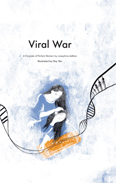
 |
In New York City, Samuel, an ordinary traffic cop, manages to thwart an attempted kidnapping. This sets him on an investigation like no other. He befriends Sohee Suh, the acclaimed Korean singer who was almost kidnapped. Sohee's DNA carries a secret that Samuel works to uncover, exposing a complex plot involving sex trafficking, government coverups, and biological warfare.
Taking place in the aftermath of a war that has left women dangerous and vulnerable, this sci-fi crime thriller explores what happens when one country's leader proposes an idea that would keep the peace in his country but involve unethical procedures. The author's tale examines a handful of issues that are at the forefront of humanity's relationship with technology, as well as with itself. Kun Yun-Junk, the leader of Korea and antagonist in this book, aims to manipulate the will of the people so that "everybody will do as we want them to do." Yun-Junk's vision stems from the desire to make women, specifically women who have been sex trafficked, more complacent and more willing to please. It then evolves into an idea of controlling people and creating perfect citizens to be "the foundation of the future of humanity." On top of that, Kun Yun-Junk's vision has a built-in fail-safe of a biological weapon in the form of a virus that can be activated in designated people.
The idea of building a perfect person (or the ideal woman) is common in science fiction but usually relates to building a humanoid robot. The author takes that concept a step further by having the "perfect women" be human, manufactured since birth. It's an ethical issue that throws up a lot of red flags and is made even more sinister by the fact that there's a whole governmental organization funding and hoping to profit from this project.
Written in script format like TV episodes, the story starts with Jo Chin-Sun, a young woman in a brothel who plays the kayagum. Chin-Sun is the catalyst for the perfect woman experiment by the Korean government, as it is her escape from trafficking and the discovery of her post-mortem that leads to Kun Yun-Junk's idea. This setup of the story comprises about one-fifth of the book and is a bit slow in that it takes a while to see where the story is going. But once this is established, the book transforms into an interesting, unconventional crime procedural.
The most compelling character is Sohee, who is aware of the strange occurrences happening in her home country, but who is also fighting to establish herself as more than just a singer. Sohee doesn't want to be famous. She wants to use her singing ability for a greater cause. While similar to the antagonist's vision, the outcome of Sohee's actions is far different and more positive.
Additionally, the author does a great job of keeping music central to the story, in everything from the presence of the kayagum instrument to Sohee's performances. There are many instances in the novel where characters say that the kayagum, when its strings are plucked, tells a story. As that instrument and its melody are passed around, the story is spread throughout the world. The author manages to make the music a counterpoint against the evil happening in the narrative, acting as a healing balm and thus adding to the fairytale.
Next Focus Review
Previous Focus Review